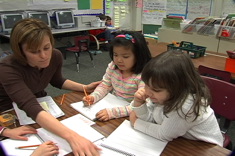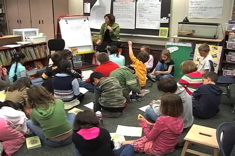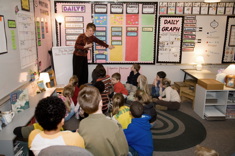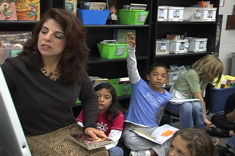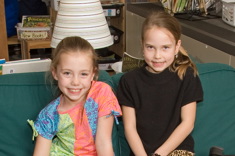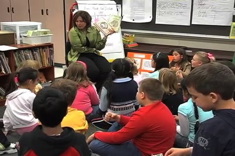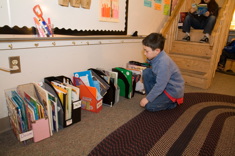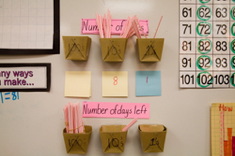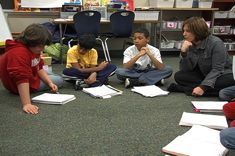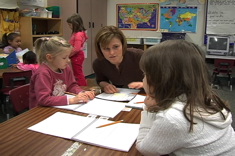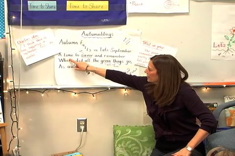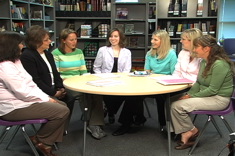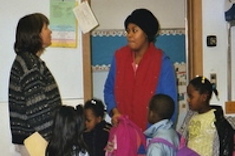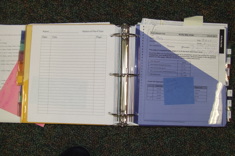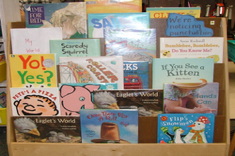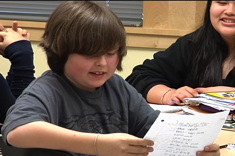Articles
Here is where you’ll find all the latest print features from our contributors. If you’d like to browse specifically by grade level, topic, or contributor, you can use the links in the right sidebar.
Latest Content
Collecting Literacy Stories Icebreaker (PRINT DOWNLOAD)
If you want a terrific activity to nudge colleagues to share more of their successes and failures, you might want to download Cindy Hatt’s question templates and explanation of the collecting stories activity. It’s also a fun strategy for building listening skills and community among teachers and coaches
Assessing Spelling in Writing Workshop Part 2: Noticing Patterns in Individuals, Small Groups and the Whole Group
Katie DiCesare took on the challenge of developing a one-page assessment tool to analyze the spelling needs and abilities of each of her 1st graders. In the second of her three-part series, Katie shows how she translates the findings from individual students into instructional plans.
Reflecting on the First Six Weeks of Word Study
Franki Sibberson explains how she rethought word study during the first six weeks of school, giving manypractical examples of activities and routines with her intermediate students.
Meeting Areas (Design Photo Essay Series)
Design tips from “The Sisters” (Gail Boushey and Joan Moser) for beautiful and functional meeting areas.
Teaching Themes Through Keywords
Aimee Buckner presents a simple strategy for helping students look for themes as they read a new text.
Strong Girls (BOOKLIST)
If Nancy Drew was an important literary role model for you when you were a preteen, you might enjoy a peek at the sassy new gals who are influencing our tweens.
Short Units, Big Messages
Those "in-between" writers in grades 3 and 4 present special challenges to teachers. Some are fluent and versatile, writing page after page of drafts. Other students struggle to craft even a sentence. Franki Sibberson explains how short texts and brief genre units can help intermediate writers with a wide range of abilities.
Root Metaphors for Teaching: Learning from Our Passions
Ruth Shagoury finds her passion for bread baking leads to rethinking how she differentiates instruction for students. Her colleagues then come up with their own metaphors in the study group activity.
Tight Spaces Part I: Maximizing Room for Literacy Learning (PHOTO ESSAY)
The Sisters (Gail Boushey and Joan Moser) have some ingenious tips for freeing up traffic paths and clustering literacy work areas.
Wall Displays (PHOTO ESSAY)
The Sisters (Joan Moser and Gail Boushey) contribute a photo essay on design tips for wall displays.
Forming Teams to Help Struggling Readers:A Pilot Project (TEMPLATES)
Andrea Smith shares observation strategies used within a teaching team. The article includes templates developed by the group.
The Rolling Pin: Looking into Things
Celebrating simple, ordinary things – it’s what poetry and learning are all about.
I Believe . . . Some Thoughts on Marathons and Sustained Professional Development in Schools
Jennifer Allen runs her first marathon, and finds the good, bad, ugly, and ultimately inspiring experience is a great metaphor for professional development design that endures.
Connecting Language and Hope: A Study Group Activity
The teaching profession needs an abundance of hope. In this creative study group activity, Andie Cunningham helps young teachers connect language and hope through art.
To Fart or Not to Fart? Reflections on Boy Writers
"To Fart or Not to Fart?" was the question at the first meeting of Jennifer Allen's boys' literacy study group for teachers, and what followed was a rollicking discussion of writing, taste, and books that hook boys.
Staying True to Our Beliefs When Working With Struggling Readers and Writers in Grades 3-6
Franki Sibberson writes about the challenges of holding true to our beliefs in working with struggling readers, and shares the questions she asks herself as a way of self-monitoring her teaching with strugglers.
Assessing Spelling in Writing Workshop Part 3: Embedding Instruction
In the last installment of this three-part series, Katie DiCesare shows how she translates the findings from individual students into instructional plans when she uses a spelling assessment in her 1st grade classroom.
Tight Spaces Part II: Design Photo Essay Series
The Sisters' design tips on tight classroom spaces cover walls and creative storage in this photo essay.
Enhance Your Classroom Poetry Collection
Franki Sibberson shares poetry collections that can do double and triple duty across the curriculum, and are favorites of her grades 3-4 students.
How I Flunked Literacy Leadership 101
Jennifer Jones finds she is still learning on the job as a literacy coach, especially when it comes to building relationships through collaborative teaching. Here she shares a breakdown in communication with a colleague, and how she is working to rebuild the relationship.
Change Quote Collection
If you're looking for some provocative quotes on change, you might enjoy this quote collection from the Choice Literacy Archives.
State Assessment Tests: Warm-Ups for Wandering Minds
Student distraction is a critical issue during assessments. Jennifer Jones provides a series of quick activities to help students focus before state examinations.
Team Sharing of Writing Curriculum Innovations (TEMPLATE)
Ruth Shagoury finds some of the best learning in her study groups comes when participants share the new things they are trying in their classrooms. She develops a nifty one-page notetaking form to help everyone keep track of ideas they want to test out with students.
Helping Classroom Volunteers Become Better Listeners
Helping volunteers understand the importance of listening to young learners is one of Andie Cunningham’s goals. Here she gives tips for preparing volunteers to confer with children.
An Assessment Notebook That Works for Me
After lots of trial and error, Franki Sibberson finally has a format for her assessment notebook that works well.
Cartwheels, Backward Rolls, and Literacy Coaching
Jennifer Allen observes the scaffolds her daughter's gymnastics teacher uses and gradually abandons over time. These observations make her think about how she is gradually releasing new teachers from different kinds of support as they enter their second, third, and fourth years of teaching.
Picture Books About Books: Young Learners and Reading Identity
Katie DiCesare gathers picture books to talk with her first graders about everything from reading identity to the proper care of books in the classroom library.
Helping Aaron Find His Voice as a Writer…and Mine as a Teacher
Erin Ocon tries a new strategy for dealing with a resistant student in her middle school classroom.
Fitness Boot Camp Helps Me Understand Struggling Readers
Franki Sibberson finishes 29th out of 30 participants in her fitness bootcamp mile run. In the process, she learns many lessons about herself and the needs of struggling learners in her classroom.
Discussion Quote Collection
These quotes give you something to talk about if you’re pondering speaking and listening.
Browse Content By
Type
Category
- Assessment Tools
- Big Fresh Archives
- Booklists
- Choice Numeracy
- Classroom Design
- Common Core
- Community Building
- Conferring
- Content Literacy
- Digital Literacy
- English Language Learners
- Equity
- Family Relations
- Free Samples
- Guiding Groups
- Leadership
- Literacy Coaches
- Mentor Texts
- Minilessons
- New Teacher Mentors
- Podcasts
- Poetry
- Quote Collections
- Reading Strategies
- Self Care
- Struggling and Striving Learners
- Talking and Listening
- Teacher Study Groups
- Teaching Reading
- Teaching Writing
- Word Study and Vocabulary
Author
- Melissa Quimby
- Nawal Qarooni
- Gwen Blumberg
- Julie Cox
- The Lead Learners
- Hannah Tills
- Josie Stewart
- Ruth Metcalfe
- Mallory Messenger
- Becca Burk
- Jodie Bailey
- Vivian Chen
- Mary Brower
- Tiffany Abbott Fuller
- Stephanie Affinito
- Ruth Ayres
- Leigh Anne Eck
- Heather Fisher
- Shari Frost
- Julie Johnson
- Suzy Kaback
- Gigi McAllister
- Shirl McPhillips
- Melanie Meehan
- Cathy Mere
- Debbie Miller
- Tara Barnett and Kate Mills
- Tammy Mulligan
- Dana Murphy
- Bitsy Parks
- David Pittman
- Brenda Power
- Heather Rader
- Matt Renwick
- Mandy Robek
- Christy Rush-Levine
- Gretchen Schroeder
- Jen Schwanke
- Brian Sepe
- Katherine Sokolowski
- Stella Villalba
- Jennifer Vincent
Grade Level
Choice Literacy Membership
Articles
Get full access to all Choice Literacy article content
Videos
Get full access to all Choice Literacy video content
Courses
Access Choice Literacy course curriculum and training


